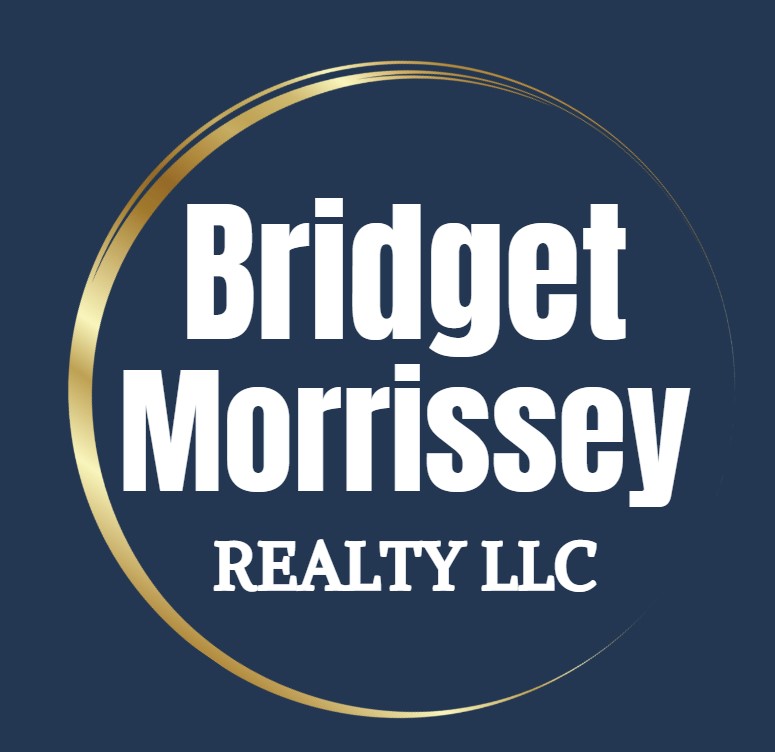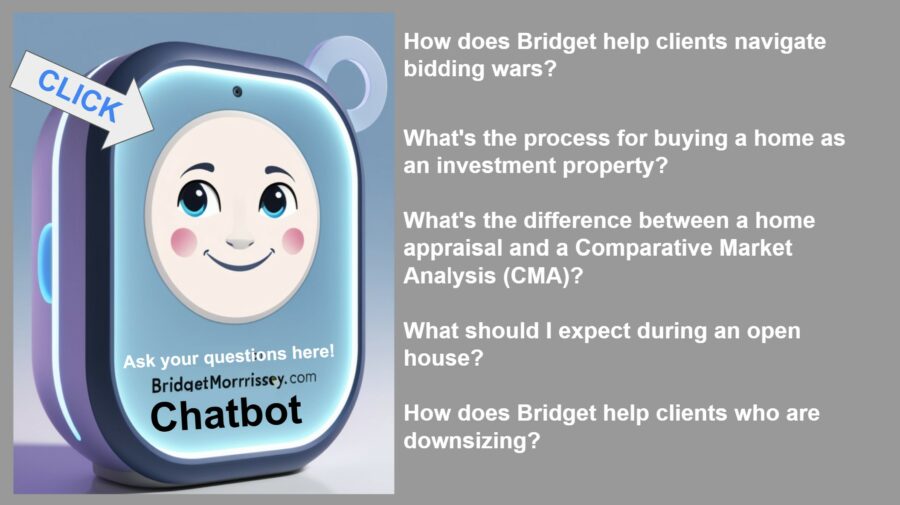Mandatory Seller Disclosures in Ledyard CT
When selling a property in Ledyard, Connecticut, homeowners are legally required to provide seller disclosures to potential buyers. These disclosures are designed to ensure transparency in real estate transactions and protect both buyers and sellers. Understanding these requirements is crucial for Ledyard homeowners looking to sell their property. This comprehensive guide will explore the mandatory seller disclosures in Ledyard, their importance, and the potential consequences of non-compliance.
Connecticut’s Residential Property Condition Disclosure Act
The foundation for seller disclosures in Ledyard is Connecticut’s Residential Property Condition Disclosure Act. This law requires sellers to complete a Residential Property Condition Disclosure Report, which must be provided to potential buyers before they make an offer on the property [1].
Key Elements of the Disclosure Report
The Residential Property Condition Disclosure Report is a comprehensive document that covers various aspects of the property’s condition. Sellers must honestly disclose information about:
1. The age of the property
2. Length of the seller’s occupancy
3. Environmental hazards (e.g., flood zones, inland wetlands)
4. Heating system condition and any known issues
5. Plumbing, sewage, and hot water system status
6. Electrical system and air conditioning functionality
7. Well water or domestic water issues (quality, quantity, pressure)
8. Structural issues (foundation, roof, walls, etc.)
9. Presence of smoke or fire damage
10. Wood treatment status
It’s important to note that sellers are required to disclose known issues based on the extent of their knowledge. They are not expected to hire professionals to inspect the property before completing the form.
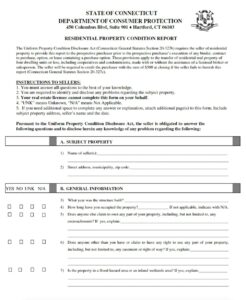
Specific Disclosures Required in Ledyard
While the state law provides a general framework, Ledyard may have additional local requirements or areas of emphasis. Sellers should be particularly aware of:
Flood Zones and Wetlands
Given Ledyard’s geography, with its proximity to the Thames River and various inland water bodies, disclosing flood risks is crucial. Sellers must indicate if the property is in a designated flood zone or contains inland wetlands.
Historical Significance
Ledyard has a rich history, and some properties may have historical significance. Sellers should disclose any known historical designations or restrictions that may affect the property.
Proximity to Naval Submarine Base
Due to Ledyard’s proximity to the Naval Submarine Base New London in Groton, sellers should disclose any known impacts on the property related to base operations, such as noise or traffic.
Well and Septic Systems
Many properties in Ledyard rely on private wells and septic systems. Sellers must disclose any known issues with these systems, including water quality, quantity, and septic system functionality.
Exemptions from Disclosure Requirements
While most residential property sales in Ledyard require disclosures, there are some exemptions [1]:
– Transfers between co-owners
– Transfers to close family members without payment
– Government transfers (federal, state, or local)
– Foreclosure sales or deed-in-lieu of foreclosure transfers
– New construction with implied warranty
However, even in exempt situations, sellers should consider voluntary disclosure to maintain transparency and goodwill in the transaction.
Consequences of Non-Disclosure
Failure to provide the required disclosures can have serious consequences for sellers in Ledyard:
Financial Penalties
Sellers who fail to provide the disclosure form may be liable for a $500 credit to the buyer at closing [1]. This penalty is relatively minor compared to potential legal ramifications.
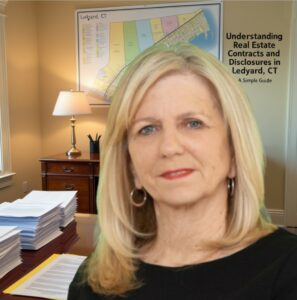
Legal Liability
More significantly, sellers who fail to disclose known issues accurately may face lawsuits from buyers after the sale. If a buyer discovers a significant problem that should have been disclosed, they may have grounds for legal action, potentially resulting in substantial damages.
Reputational Damage
In a close-knit community like Ledyard, a seller’s reputation can be severely damaged by failing to disclose property issues. This can have long-lasting effects beyond the immediate transaction.
Best Practices for Ledyard Sellers
To ensure compliance and protect themselves, Ledyard sellers should follow these best practices:
1. Be thorough and honest:
Disclose all known issues, even if they seem minor. It’s better to over-disclose than under-disclose.
2. Document everything:
Keep records of all disclosures made and any supporting documentation (e.g., repair receipts, inspection reports).
3. When in doubt, disclose:
If you’re unsure whether something needs to be disclosed, err on the side of caution and include it.
4. Stay updated:
Keep abreast of any changes to local or state disclosure requirements.
5. Work with professionals:
Engage a local real estate agent and attorney familiar with Ledyard’s specific requirements to ensure full compliance.
The Role of Real Estate Professionals
Real estate agents and attorneys play a crucial role in the disclosure process:
Real Estate Agents
Agents can guide sellers through the disclosure process, ensuring all required forms are completed accurately and thoroughly. They can also advise on local market practices and buyer expectations.
Real Estate Attorneys
An attorney can review the disclosure forms, advise on legal obligations, and help mitigate risks associated with the sale. They can also assist in addressing any complex disclosure issues that may arise.
Emerging Trends in Seller Disclosures
As real estate practices evolve, new trends in seller disclosures are emerging:
Environmental Concerns
With increasing awareness of environmental issues, buyers are becoming more interested in disclosures related to energy efficiency, sustainability, and potential environmental hazards.
Smart Home Technology
As smart home features become more common, sellers may need to disclose the presence and functionality of integrated technology systems.
Neighborhood Developments
Buyers are increasingly interested in future developments that may affect the property. While not always required, disclosing known plans for nearby construction or changes in zoning can be beneficial.
The Buyer’s Responsibility
While sellers have significant disclosure obligations, buyers also have responsibilities:
1. Due diligence:
Buyers should thoroughly review all disclosures and ask follow-up questions if needed.
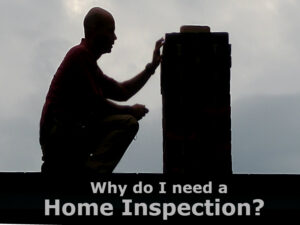
2. Professional inspections:
Even with seller disclosures, buyers should conduct their own professional inspections.
3. Research:
Buyers should research the property and neighborhood independently, as some information may not be required in seller disclosures.
Conclusion
Mandatory seller disclosures in Ledyard, CT, are a critical component of the real estate transaction process. They protect both buyers and sellers by ensuring transparency and setting clear expectations. Sellers must approach these disclosures with honesty and thoroughness, understanding that full compliance not only meets legal obligations but also builds trust and can lead to smoother transactions.
For Ledyard homeowners preparing to sell, the key is to be proactive, thorough, and honest in your disclosures. Work closely with local real estate professionals who understand the nuances of Ledyard’s market and legal requirements. By doing so, you can navigate the disclosure process confidently, minimize legal risks, and set the stage for a successful and ethical property sale.
Remember, while disclosures may seem daunting, they ultimately serve to protect all parties involved in the transaction. By embracing transparency and meeting your legal obligations, you contribute to the integrity of Ledyard’s real estate market and help ensure that your property transaction is fair, ethical, and legally sound.
Frequently Asked Questions
What can I help you with today?
About the Author

Bridget Morrissey![]() is not just a Realtor but a multifaceted professional dedicated to her community. In addition to her real estate expertise, she’s the author of “Nautical Tales & Nature Trails, Recreation in southeastern Connecticut and southern Rhode Island,” available on Amazon. She also produces the Public Access TV Show of the same name, sharing her passion for local landscapes and communities. Whether you’re looking to sell your home or find your dream property, Bridget Morrissey’s comprehensive approach ensures you receive insightful guidance throughout your real estate journey.
is not just a Realtor but a multifaceted professional dedicated to her community. In addition to her real estate expertise, she’s the author of “Nautical Tales & Nature Trails, Recreation in southeastern Connecticut and southern Rhode Island,” available on Amazon. She also produces the Public Access TV Show of the same name, sharing her passion for local landscapes and communities. Whether you’re looking to sell your home or find your dream property, Bridget Morrissey’s comprehensive approach ensures you receive insightful guidance throughout your real estate journey.
Citations:
[1] https://www.fssplaw.com/news/2022/october/disclosure-requirements-for-selling-ct-real-esta/
[2] https://www.rockethomes.com/real-estate-trends/ct/ledyard
[3] https://www.redfin.com/minorcivildivision/402/CT/Ledyard
[4] https://www.ledyardct.org/DocumentCenter/View/5466/2015-Revaluation-RFP
[5] https://www.bridgetmorrissey.com/ledyard-real-estate-hot-spot/
[6] https://www.bridgetmorrissey.com/communities/ledyard-real-estate/
[7] https://walletinvestor.com/real-estate-forecast/ny/cayuga/ledyard-housing-market
